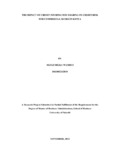| dc.description.abstract | With effect from 31st July 2010 credit information sharing was rolled out in Kenya. It was to be done through licensed credit reference bureaus (CRBs). In Kenya there exist two licensed CRBs that facilitate sharing of credit information. The purpose of this study is to determine the impact of credit information sharing on credit risk for commercial banks of Kenya. The information shared by banks in Kenya is both positive and negative. Non-performing loan is used as a proxy to credit risk.
The population of this study consisted of all 44 banking institutions registered and
operational in Kenya under the banking Act. The study utilized both secondary and primary data. Quantitative data on credit risk for commercial banks was extracted from annual reports, profit and loss accounts, balance sheets and cash flow statements. Data on credit information sharing was obtained through the use of questionnaires that were directed to commercial banks in Kenya. Chi-Square test was used to determine whether there is a significant difference between the expected frequencies and the observed frequencies in one or more categories.
The study recommends that to be included in the CRB data base are institutions like Savings and Credit Co-operative Societies, Higher education Loans Board among others. In addition the study recommends both „Black‟ and „White‟ information be made mandatory to be shared in order to make the information sharing beneficial to all stakeholders. The study established that that there is a significant difference on the reports requested by banks from credit reference bureaus. The volumes in terms of information shared of nonperforming loans before and after information sharing shows an increase in the period after although when tested by Chi-square shows no significant difference. The comparison of nonperforming loans before and after the roll out of credit information sharing shows a decrease in non-performing loans.
The study concludes that credit information sharing has a positive impact on credit risk
although is not statistically significant. | en |

